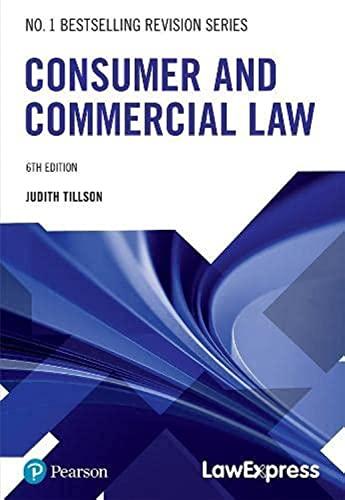Question
Unit 4 DB: The Federal Trade Commission and Consumer Protection Unit 4 DB: The Federal Trade Commission and Consumer Protection After reading about the Fair
Unit 4 DB: The Federal Trade Commission and Consumer ProtectionUnit 4 DB: The Federal Trade Commission and Consumer Protection
After reading about the Fair and Accurate Credit Transactions Act (FACT ACT) on pages 48-23 and 48-24 of the textbook, answer the following:
Describe the ways that the provisions of the FACT ACT combat the problem of identity theft. Do you think that the FACT ACT goes far enough? Explain why or why not.
Comment on at least two other students' opinions.
page 48-23
Since the best rates (the Government's preferred baseline) presumably go only to a minority of consumers, adopting the Government's view would require insurers to send slews of adverse action notices; every young applicant who had yet to establish a gilt-edged credit report, for example, would get a notice that his charge had been "increased" based on his credit report. We think that the consequence of sending out notices on this scale would undercut the obvious policy behind the notice requirement, for notices as common as these would take on the character of formalities, and formalities tend to be ignored. It would get around that new insurance usually comes with an adverse action notice, owing to some legal quirk, and instead of piquing an applicant's interest about the accuracy of his credit record, the commonplace notices would mean just about nothing and go the way of junk mail. Assuming that Congress meant a notice of adverse action to get some attention, we think the cost of closing the loophole would be too high.
In GEICO's case, the initial rate offered to Edo was the one he would have received if his credit score had not been taken into account. GEICO [therefore] owed him no adverse action notice under 1681m(a). Safeco did not give Burr and Massey any notice because it thought 1681m(a) did not apply to initial applications, a mistake that left the company in violation of the statute if Burr and Massey received higher rates "based in whole or in part" on their credit reports; if they did, Safeco would be liable to them on a showing of reckless conduct (or worse). The first issue we can forget, however, for although the record does not reliably indicate what rates they would have obtained if their credit reports had not been considered, it is clear enough that if Safeco did violate the statute, the company was not reckless in falling down in its duty.
While "the term recklessness is not self-defining," the common law has generally understood it in the sphere of civil liability as conduct violating an objective standard: action entailing "an unjustifiably high risk of harm that is either known or so obvious that it should be known." [Case citation omitted.] It is this high risk of harm, objectively assessed, that is the essence of recklessness at common law.
There being no indication that Congress had something different in mind, we have no reason to deviate from the common law understanding in applying the statute. Thus, a company subject to the FCRA does not act in reckless disregard of it unless the action is not only a violation under a reasonable reading of the statute's terms, but shows that the company ran a risk of violating the law substantially greater than the risk associated with a reading that was merely careless.
Here, there is no need to pinpoint the negligence/recklessness line, for Safeco's reading of the statute, albeit erroneous, was not objectively unreasonable. On the rationale that "increase" presupposes prior dealing, Safeco took the definition as excluding initial rate offers for new insurance, and so sent no adverse action notices to Burr and Massey. While we disagree with Safeco's analysis, we recognize that its reading has a foundation in the statutory text, and a sufficiently convincing justification to have persuaded the district court to adopt it and rule in Safeco's favor.
The Court of Appeals correctly held that reckless disregard of a requirement of the FCRA would qualify as a willful violation within the meaning of 1681n(a). But there was no need for that court to remand the cases for factual development. GEICO's decision to issue no adverse action notice to Edo was not a violation of 1681m(a), and Safeco's misreading of the statute was not reckless.
Judgments of Court of Appeals reversed, and cases remanded for further proceedings consistent with Supreme Court's opinion.
Step by Step Solution
There are 3 Steps involved in it
Step: 1

Get Instant Access to Expert-Tailored Solutions
See step-by-step solutions with expert insights and AI powered tools for academic success
Step: 2

Step: 3

Ace Your Homework with AI
Get the answers you need in no time with our AI-driven, step-by-step assistance
Get Started


